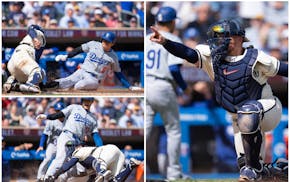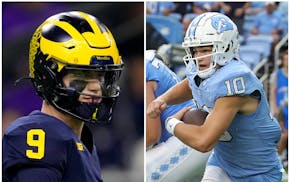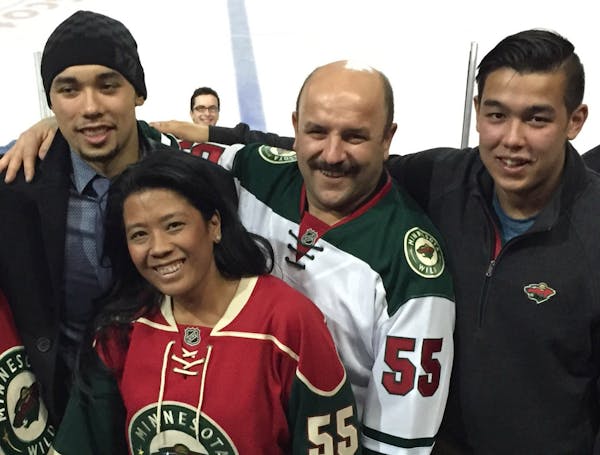This space is officially an Ott-free zone today, which means we're n-Ott going to discuss the bush-league antics of a certain kn-Otthead who has amassed a grand total of zero points and 22 penalty minutes for the St. Louis Blues in three playoff games against the Wild.
That kind of buffoonery should not be misconstrued as toughness.
Want to see real hockey toughness?
Watch Zach Parise's work ethic on every shift, the way he never stops moving his feet.
Watch Ryan Suter take a hit in order to make a play.
Watch Mikael Granlund look to initiate contact.
Watch tiny Jared Spurgeon throw himself in front a fast-moving puck to block a shot.
Watch Charlie Coyle hold his ground, stone-faced, as David Backes tries to engage him into post-whistle shenanigans.
That's authentic toughness, a philosophy the Wild espouses as a fundamental tenet to its style of play.
"I think a lot of guys confuse it," Coyle said. "It's not just fighting, it's being physical. We have smaller guys who are tough out there and play strong. They're not afraid. They won't back down."
Hockey romanticizes the idea of toughness, especially in the playoffs. The term often conjures up images of fights, bloodthirsty hits against the glass, shoving matches after play has stopped. Basic rough-and-tumble stuff.
Toughness is a necessary component to hockey, but it can manifest itself in more subtle ways. It isn't limited to face washes and fisticuffs.
"There's different kinds of toughness," Suter said. "I think we have good team toughness."
The Wild's game is predicated on playing tough without acting like a bunch of tough guys. A disciplined focus says a lot about a team's mental toughness, and the Wild has displayed a remarkable level of restraint in this series.
"Toughness is not just about fighting or punching guys or hammering guys," said Chris Stewart, who has found himself in the middle of scrums.
The Blues have tried to draw the Wild into some extracurricular nonsense with little effect so far. Wild players made a pact for how they'll handle those moments. They laugh and move along.
That seems to infuriate the Blues even more because they're not able to get inside the Wild's collective head and distract them. Wild players seem to enjoy antagonizing the antagonists.
"When something happens, you want to do something [retaliatory]," Suter said. "We've made a thing in here that you just smile and go have a good shift the next time out."
The narrative entering this series focused on the Blues' size and physical style of play. That premise seemed to suggest the Wild could be pushed around, which was flawed logic that has been proven decidedly wrong thus far.
The Wild has outhit the Blues 89-84 through three games and, in the process, has drawn only five penalties, none in Game 3 when the Blues lost their cool and attempted to suck the Wild in, too.
"We're tough in a lot of different areas," Matt Dumba said. "It's not just the general meaning of tough, fighting or hitting. We're a very mentally tough team. A team that sticks to our system and has really bought into what we're doing."
The Wild's lineup is not filled with bruisers who intimidate opponents with size and muscle. Their toughness flows from overall team speed and commitment to defense. The Wild plays fast and with a hard edge to its game.
Game 3 offered a textbook example. The Wild smothered the Blues with tight checking, clogging up shooting lanes, blocking shots when necessary, winning races to pucks, battling hard along the boards.
That speed can seem relentless when humming at an Autobahn pace like in Game 3. Blues coach Ken Hitchcock said it felt like the Wild had 12 players on the ice.
"They're winning the swarm game," he said. "Their physical play is different, but it's still very physical. As far as running people over … it's not relevant. What's relevant is when the battle's on the boards, who comes out with the puck, and they're winning more of that than we are right now."
That's the very definition of toughness, and that brand of hockey is far more effective than all the silly stuff after the whistle. The Wild doesn't need to get dragged into nonsense to prove it's a tough team.
It's better to laugh and just keep grinding away.
Chip Scoggins chip.scoggins@startribune.com

Scoggins: Finch feeling heat of the Suns as playoff battle looms
Scoggins: Why 'championship or bust' fits these Wolves

Scoggins: Anatomy of a game-saving play as Correa throws out Ohtani


